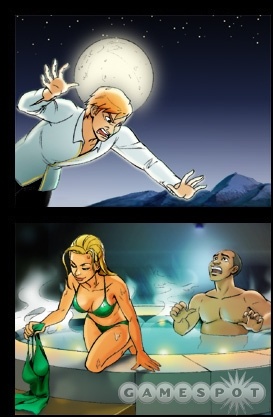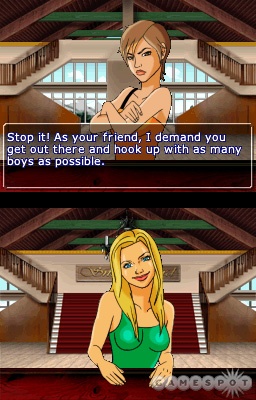Though the dating simulation genre has enjoyed success for years in Japan, romance and gaming have remained fairly mutually exclusive in the United States. There seems to be a trend emerging, though, and Ubisoft's Sprung is right on the forefront of it. Despite being fairly reminiscent of the text-based PC adventures of yore, there's really not much quite like Sprung on the market. Yet, despite some pretty good writing, catchy music, and nicely drawn 2D art, the experience suffers because of repetitive and oft-frustrating gameplay.

Sprung isn't really a dating simulation in the strictest sense, so it could be more aptly described as a romantic adventure. You can play as either Brett or Becky, two well-toned, good-looking young adults who are each looking for love while vacationing at a fairly upscale ski resort town. Their escapades will take place all over town, including at the ski lodge, in a gondola, at a popular nightclub, and, of course, in a hot tub. The writing in Sprung is actually one of the strongest points of the game, and despite some occasional corniness and a few awkward turns, the dialogue is pretty good, which gives you a good sense of each of the characters, though many of them rely on cookie-cutter stereotypes. The game gives off a real Dawson's Creek kind of vibe, which shouldn't surprise anyone, especially considering that the story was crafted by one of the writers on the pretty-young-things TV drama North Shore. If you don't have the stomach for this kind of melodrama, Sprung won't have much appeal for you.
Each character has his or her own story, and these stories are broken up into series of scenes. These scenes vary in length and complexity, but for the most part, they boil down to engaging in conversation (by way of a standard dialogue tree) and subsequently steering the conversation toward a specific outcome, which usually involves getting involved with a member of the opposite sex, foiling another character's plans, or playing matchmaker for other characters. The interface is simple, so you'll see your character's picture on the lower screen, and the person you're chatting with will appear on the top screen. The game has touch-screen support for all the menu options, but it's just a lot easier to play the game with the D pad and the buttons.
The scenarios have a tendency to feel kind of disjointed when you go from one to the next, but the fundamental problem with Sprung is its trial-and-error gameplay. With a few exceptions, there is generally only one acceptable outcome for a scenario, though there are usually several paths along the dialogue tree that you can take to get there. Making the wrong choice can end the scene instantly, and the right choice is rarely very intuitive, though the game tends to make the least likely choice the correct one. Aside from a really long streak of good luck, you'll inevitably have to replay many scenes over and over again before you pick just the right dialogue path. Consequently, this grind sucks the fun out of what is otherwise a fairly whimsical experience. To the game's credit, there are a few scenes that both require some actual deductive reasoning and present some pretty good challenges, though you'll feel like you're being pushed down a very narrow path, with no real control over the proceedings. There are 50 different scenes between Brett and Becky, and the amount of time it takes you to get through the game can vary wildly depending, basically, on how lucky you get. Taking the straightest path through some scenes can take fewer than a minute, while it's possible to get stuck on one of the more complex scenes for a good half hour.

Though it doesn't really push the technical capabilities of the DS, Sprung does have a fairly distinct look to it, and it uses 2D sprites to represent the characters. The game's European's roots are fairly apparent in the art style, which is reminiscent of a French comic book. The characters look appropriately glossy and hip, and even the "dirty hippy" character is attractive, well dressed, and well groomed. Each character has a handful of emotive animations, which themselves are fairly smooth and effective, but because of their limited numbers, these animations repeat fairly often, and they don't always match the tone of the dialogue they accompany. With the dialogue written in text, the game's soundtrack fills in the void and actually does a pretty good job of it. Each location has a unique tune, so a crunky hip-hop beat plays when you're in the club, for example. Furthermore, there's some situation-specific music as well. The best music in the game, though, is the theme that plays when you've successfully completed a scene, because it has an infectiously gaudy, Euro-dance synth line that's too hummable for its own good.
Sprung is an interesting experiment, and as the second DS game from Ubisoft, it's a pretty bold move by the French publisher. Its willingness to tread some risqué ground, which most games tend to sidestep, is definitely intriguing, but your actual participation in the game feels kind of limited, and the repetition inherent to its gameplay makes Sprung even harder to recommend.